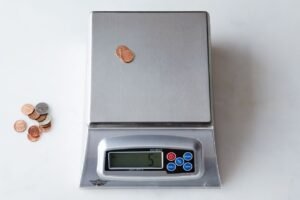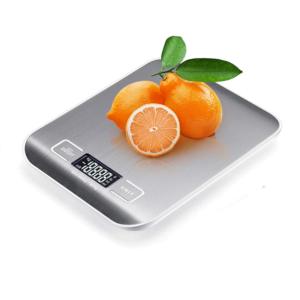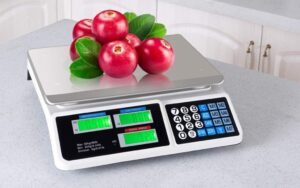Some chefs will tell you that baking is a science, while others will insist that it is an art, but the truth is that both parties will resume to measuring instruments to make sure the final result is not only edible but spectacular.
While using your old measuring cup is still a practical method that, in most cases, will make the recipes work, if you are up for surprising your loved ones with a fancy soufflé, you’ll most likely need the help of a kitchen scale, a digital one preferable, as it can offer you more accurate readings.
Nonetheless, two questions arise here. To what degree can you rely on its accuracy, and is it worth investing in one?
In this article, we’ll try to answer these questions. Moreover, we will offer you a method to determine if your home scale is accurate, so stay with us as we unravel the secrets of perfect baking.

What Levels of Accuracy do Kitchen Scales Offer?
If we were to compare analog with digital models, there’s no doubt that the second category would win. Analog units are great for rougher measurements, but if you want to obtain double decimal readings, you’ll need the precision of the latest technology. A quick scroll through the newest kitchen scale reviews could help you get a picture of how accuracy varies with the price and how much could you end up paying for it. Nonetheless, in most cases, high-accuracy is backed by solid designs that make the units worth all the many.
This being said, let’s take a look at the levels of accuracy you can get:
- 10-gram or more – many analog scales offer increments this big, which will tell you that your measurement is right with a possible variation of a few grams. If you are making a simple recipe, most likely this variation won’t even be visible.
- 1-gram – found in most digital models, this system offers good accuracy for most recipes, even those that imply moderate to high difficulty.
- 1-gram or less – will give you readings up to one decimal, being the most dependable. They are also called diet scales, as they can estimate the weight of a portion precisely.

How Can I Tell if my Kitchen Scale Is Accurate?
Before performing this task, it is necessary to make a distinction between accuracy and precision. These terms are often mixed, so here is how things work.
- Accuracy – measures how close to the real value the reading is. Here’s a simple test:
- Take a coin of your choice and check its specification on a governmental website. These items are designed to have all the exact same weight. For example, a new nickel will weigh 5.000 grams.
- Place it on the scale. If it is a two decimal model, it should show 5.00. A one decimal unit will show 5.0, while one that has an accuracy of 1 gram will only show 5. If this isn’t the case, your unit is off.
- While it isn’t a tragedy that it is wrong with a few decimals, or even with a gram, in some cases, if you encounter higher variations, you may want to get it recalibrated. The manufacturer can help with this task.
- Precision – it shows how close to the real value the measurements stay when weighing the same quantity several times. Follow the steps to determine if your unit is precise:
- Take a coin and check its official weight.
- Place it on the scale and lift it three times or more.
- Compare the values. If they are identical or the variation is insignificant, you have a precise model.
Note that precision isn’t always accompanied by accuracy, so even if your scale shows the same result every time, it doesn’t necessarily mean it is the right one.

Do I Need One?
Now that you’ve seen how they work, how exact they can be, and how you can make sure you get the correct values, it’s time to determine if you could use one in your kitchen. Our guess is you do, and here are three reasons why you should invest in one:
- Your baking will improve – you will never stay in front of a flat cake again and ask yourself what could have possibly gone so wrong for it to look so desolating. In most cases, bad measuring is the cause. Once you start using the right quantities and make sure you can rely on a good oven, you can even move to the soufflé level and get them baked to perfection from the first try.
- Your portions will have the right size – Staying healthy doesn’t only imply eating healthy food but watching over the size of your portions. Balance is the secret, and this is actually what scales know to do best.
- Better organization – a measuring cup needs to be emptied and washed every time you change the ingredient, and this can mean more time wasted. With a scale, you can just place the plate with the ingredients, and it will automatically subtract the weight of the plate. Moreover, with the tare function, you can set it to zero and add a new ingredient to the mix. It is that simple.
The Bottom Line
We are always on the run, so any appliance that can reduce the time spent in the kitchen is welcomed. Thus, an accurate scale can help you get your baking right from the first try and offer you more time to enjoy the results. Moreover, if you are on a strict diet plan, it will help you portion your meals and get healthy and fit in a shorter time.